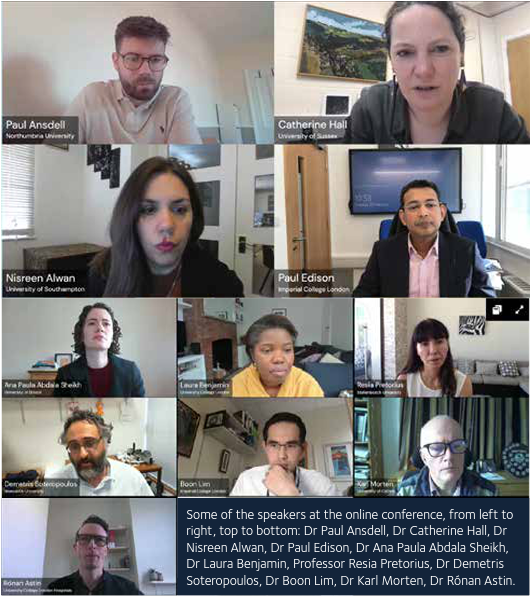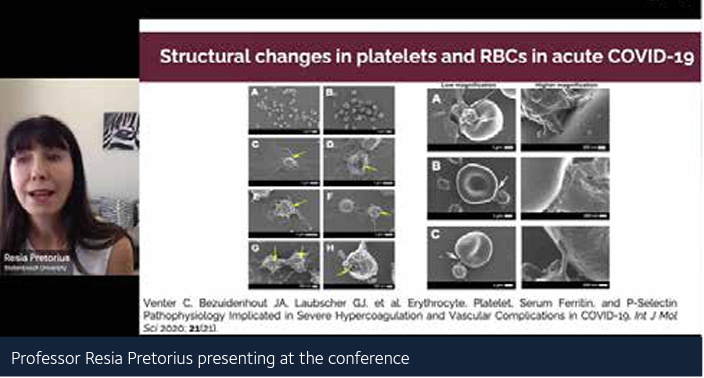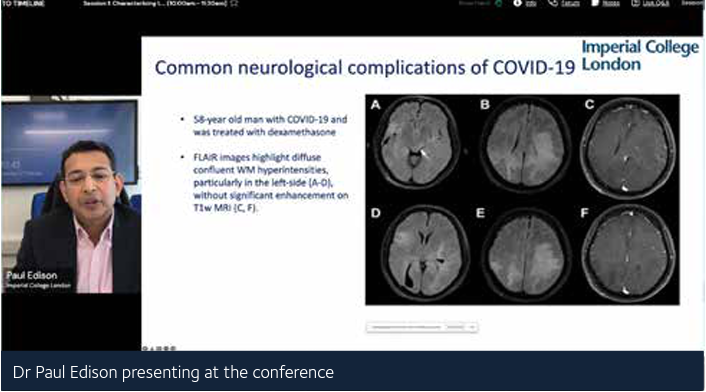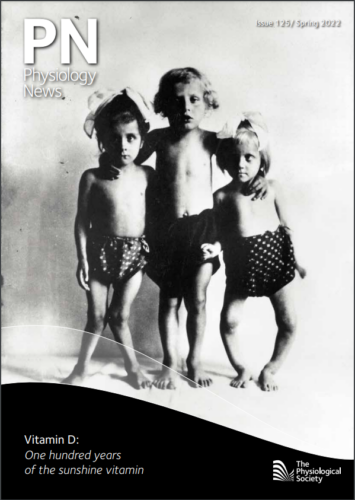
Physiology News Magazine
Meeting report: Long COVID: Mechanisms, Risk Factors, and Recovery
Events
Meeting report: Long COVID: Mechanisms, Risk Factors, and Recovery
Events
https://doi.org/10.36866/pn.25.36
Dr Catherine Hall, Chair of The Society’s Conferences Committee, University of Sussex, UK
This innovative two-day conference reviewed the challenges of understanding the pathophysiological changes following COVID-19 infection. These persistent symptoms following SARS-CoV-2 infection, otherwise known as “long COVID”, have affected people all around the world. It is a heterogeneous disease with multimorbidities and affecting many physiological systems.
Held online from 22-23 February 2022, the conference brought together over 300 physiologists, clinicians, and those affected by long COVID to better understand the underlying mechanisms and identify potential therapies.

The diverse speaker panel addressed topics including characterising long COVID, why some people get it and others don’t, the impact of long COVID on active individuals, mechanisms, and the research needed for finding treatments. The conference concluded with a panel discussion on research directions, how to implement this research and how to integrate it with policy. Participants found the two days both innovative and thought provoking, as the accounts from Laura and Duncan, below, show.
Several speakers commented on the importance of considering the breadth of physiology when trying to work out the characteristics and potential mechanisms underlying long COVID. Many questions remain about the aetiology and optimal therapeutic approach for treating long COVID. Opportunities such as this to try to collectively fit pieces of the puzzle together are likely to be invaluable for shaping future research directions to start to provide much needed answers.
Society members are reminded that all talks are available to watch on demand on the EventsAIR platform until 31 May 2022. For access, please contact The Society’s events team (events@physoc.org).

Dr Duncan Banks
School of Life, Health and Chemical Sciences, The Open University, UK
On the first day of the conference, I was fortunate to co-chair the Flash Talk session with my Society colleague Professor Sue Deuchars (University of Leeds, UK). We facilitated eight fascinating presentations that challenged our understanding of the pathophysiological changes that follow COVID-19 infection. The prolonged symptoms of long COVID have affected people throughout the world, are physiologically indiscriminate and target multiple systems leading to a plethora of debilitating symptoms.
Physiologists and clinicians from universities across the UK, the Luxembourg Institute of Health, Federal University of Minas Gerais, Brazil, and Trinity College Dublin described the underlying mechanisms and identified potential therapies for long COVID. A talk by Professor Chris Burton and colleagues suggested that COVID-19 affects interoception and that vagal afferent function was disturbed, and that “inaccurate sensing due to disturbed interoception should result in inconsistent patterns of symptoms and relationships with activity”. Dr Ahmed El-Medany and colleagues suggested that cardiopulmonary exercise testing could help to progress our understanding of why nonhospitalised individuals with post COVID-19 syndrome have ongoing symptoms. Aurelie Fischer described how her study was investigating clinically relevant clusters of people with different forms of long COVID. According to Clara Carvalho, elite athletes were not spared the ravages of COVID and a return to sports needed to be gradual with medical follow-up recommended. Similar findings by Rebecca Owen showed that increased physical activity offers no protection against developing long COVID, reinforcing COVID’s indiscriminate nature. Dr Roman Romero-Ortuno’s talk described how subtle respiratory dysfunction with reduced peak O2 consumption may contribute to reduced fitness in long COVID, but this may improve over time. Laura Taramova and colleagues used the facilities of the local long COVID clinic to investigate major chronic ailments present with the condition and provide optimal treatments. Comparing the profiles of individuals hospitalised with the virus with those referred to long COVID services, James Yates provided evidence of improved functional status across the board but the extent to which this was observed in long COVID was markedly lower.

Laura Taramova
BSc Pharmacology undergraduate student from University of Reading, UK
Long COVID has been characterised by a wide spectrum of symptoms with some of them being fatigue, myalgia, shortness of breath and brain fog. The Physiological Society brought together researchers, physiologists and wider public individuals to discuss their research and underlying mechanisms of long COVID, its characterisation and prevalence amongst the public as well as potential treatment.
The mechanisms behind long COVID are complicated, however, the speakers were able to collectively compose the bigger picture during the conference. Some aspects of personal interest included cytokine storms, which may persist after the acute phase of COVID-19. Cytokine storms could lead to hypercoagulability, and literature suggests, a higher risk of venous thrombosis.
Presenters also highlighted that long COVID seemed to predominantly affect females, which may be explained by hormonal differences between sexes. This aspect intrigued me as we observed a similar trend during data collection for our study.
At the Flash Talks sessions, researchers (some of them being from different parts of the world) presented their pilot studies exploring various long COVID aspects. It was particularly interesting to find out that people with higher physical activity levels prior to contracting COVID-19 were not entirely protected from its consequences, as one would have thought.
Therapeutic interventions are under methodical research; nevertheless, there were sessions aimed at potential pharmacological aspects like treatment with monoclonal antibodies. Our team at The University of Reading is also looking at pharmacological management of pain, cardiac, respiratory, and gastrointestinal conditions by collecting questionnaire responses from patients attending postCOVID assessment clinics.
I was amazed by the variety of studies going on across the world, scientists standing together to explore SARS-CoV-2 and its consequences. As an undergraduate student, I was grateful throughout for such an opportunity to listen to brilliant researchers, gain deeper understanding of long COVID and present our own study at the Flash Talks session.
